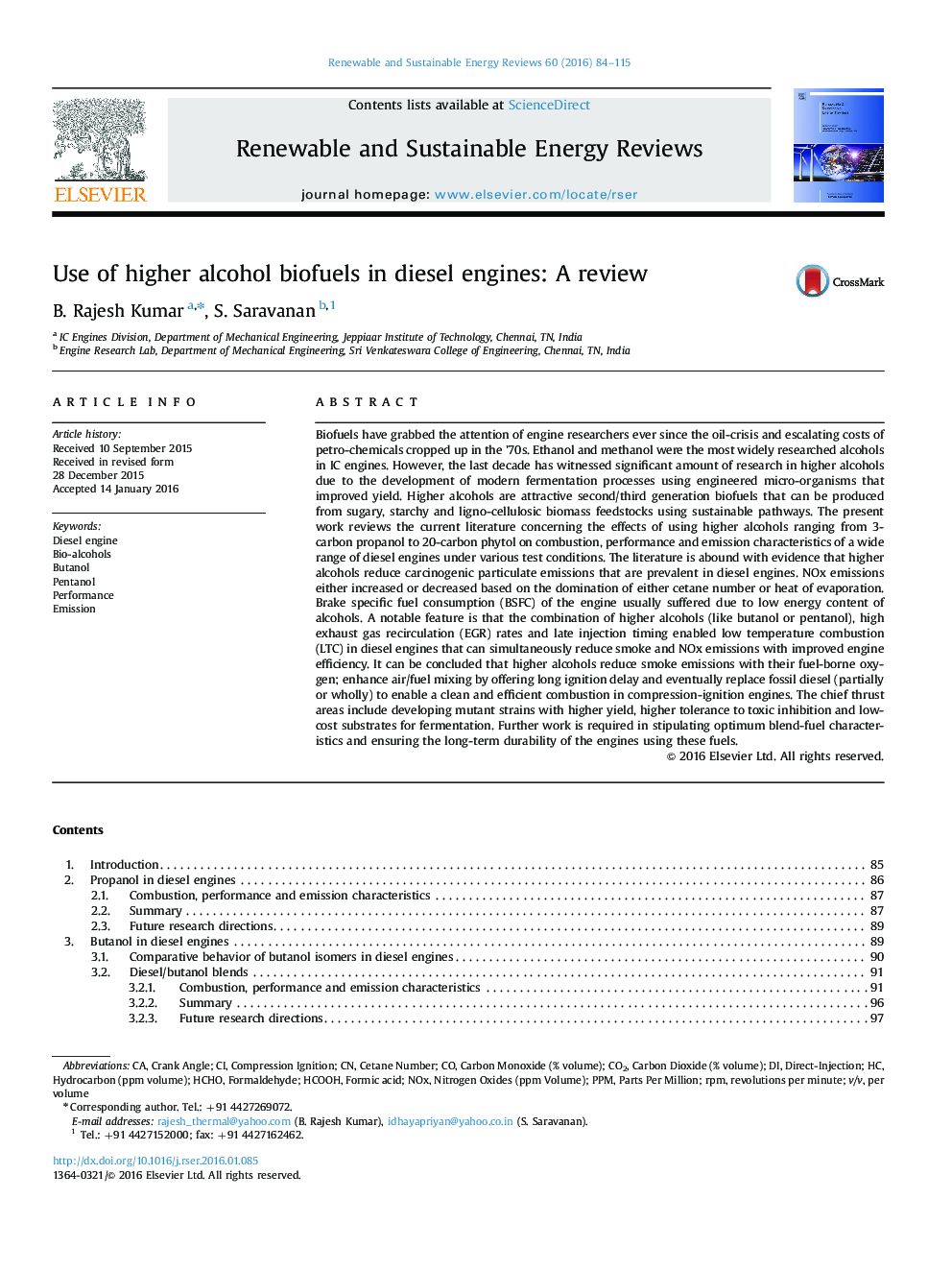| کد مقاله | کد نشریه | سال انتشار | مقاله انگلیسی | نسخه تمام متن |
|---|---|---|---|---|
| 8113738 | 1522325 | 2016 | 32 صفحه PDF | دانلود رایگان |
عنوان انگلیسی مقاله ISI
Use of higher alcohol biofuels in diesel engines: A review
ترجمه فارسی عنوان
استفاده از سوخت های زیستی با الکل در موتورهای دیزلی: بررسی
دانلود مقاله + سفارش ترجمه
دانلود مقاله ISI انگلیسی
رایگان برای ایرانیان
کلمات کلیدی
Bio-alcoholsppmRPMHCOOHHCHONOx - NOXv/v - V / Vcompression ignition - احتراق فشرده سازیFormic acid - اسید فرمیکEmission - انتشارButanol - بوتانولDirect-injection - تزریق مستقیمCetane number - تعداد سیمانCrank Angle - زاویه میل لنگrevolutions per minute - سرعت در هر دقیقهFormaldehyde - فرمالدئیدparts per million - قطعات در میلیونDiesel engine - موتور دیزلPentanol - پنتانولPerformance - کاراییCO2 - کربن دیاکسید
موضوعات مرتبط
مهندسی و علوم پایه
مهندسی انرژی
انرژی های تجدید پذیر، توسعه پایدار و محیط زیست
چکیده انگلیسی
Biofuels have grabbed the attention of engine researchers ever since the oil-crisis and escalating costs of petro-chemicals cropped up in the ׳70s. Ethanol and methanol were the most widely researched alcohols in IC engines. However, the last decade has witnessed significant amount of research in higher alcohols due to the development of modern fermentation processes using engineered micro-organisms that improved yield. Higher alcohols are attractive second/third generation biofuels that can be produced from sugary, starchy and ligno-cellulosic biomass feedstocks using sustainable pathways. The present work reviews the current literature concerning the effects of using higher alcohols ranging from 3-carbon propanol to 20-carbon phytol on combustion, performance and emission characteristics of a wide range of diesel engines under various test conditions. The literature is abound with evidence that higher alcohols reduce carcinogenic particulate emissions that are prevalent in diesel engines. NOx emissions either increased or decreased based on the domination of either cetane number or heat of evaporation. Brake specific fuel consumption (BSFC) of the engine usually suffered due to low energy content of alcohols. A notable feature is that the combination of higher alcohols (like butanol or pentanol), high exhaust gas recirculation (EGR) rates and late injection timing enabled low temperature combustion (LTC) in diesel engines that can simultaneously reduce smoke and NOx emissions with improved engine efficiency. It can be concluded that higher alcohols reduce smoke emissions with their fuel-borne oxygen; enhance air/fuel mixing by offering long ignition delay and eventually replace fossil diesel (partially or wholly) to enable a clean and efficient combustion in compression-ignition engines. The chief thrust areas include developing mutant strains with higher yield, higher tolerance to toxic inhibition and low-cost substrates for fermentation. Further work is required in stipulating optimum blend-fuel characteristics and ensuring the long-term durability of the engines using these fuels.
ناشر
Database: Elsevier - ScienceDirect (ساینس دایرکت)
Journal: Renewable and Sustainable Energy Reviews - Volume 60, July 2016, Pages 84-115
Journal: Renewable and Sustainable Energy Reviews - Volume 60, July 2016, Pages 84-115
نویسندگان
B. Rajesh Kumar, S. Saravanan,
